I recently interviewed Dr. Mavis Owureku-Asare on Breakfast Daily on Citi TV with her colleague scientists who were all recipients of the OWSD Early Career Fellowship, a prestigious fellowship that awards up to $50,000 to women who have completed their doctorates in Science, Technology, Engineering, and Mathematics (STEM). Dr. Owureku-Asare’s story stood out because Citi TV had just embarked on an ‘Operation Feed Yourself’ campaign, which is an initiative encouraging young people to get involved in agriculture and agribusiness.
Her journey is a remarkable one for any young person looking for more proactive ways to solve the nation’s dependence on imports of agricultural produce.
Who is Mavis Owureku-Asare?
Dr. Owureku-Asare is a Food Safety Expert and a Senior Research Scientist at the Biotechnology and Nuclear Agriculture Research Institute (BNARI) – Ghana Atomic Energy Commission (GAEC).
She is also the Head of The Radiation Technology Centre of BNARI and has over fifteen years of experience in food and agricultural research.
Her specialty is in food processing technologies with a focus on post-harvest management of agricultural produce.
If I have lost you at this point, don’t worry, what all this means is that she is a very credible person in the food and agricultural research space and is just the kind of person we need to engage as we think of ways to decrease our dependence on agricultural imports.
As a big advocate for Ghana to create its own produce, I was excited to learn that Dr. Owureku-Asare’s research centered on our ability to turn tomatoes into tomato paste locally through solar.
Doc. Please tell us about the problem you are solving with your research?
Tomato is a crop of high economic importance in Ghana, yet providing farmers with reliable processing facilities has been challenging for successive governments.
Processing factories had been built, but a number of factors including the complexity of setting up and high cost of running these facilities led to their closure.
These challenges are creating enormous problems for farmers who are the suppliers of the raw materials.
This problem is not only affecting farmers but the country as a whole. Ghana is ranked the second-largest importer of tomato paste in the world, we consume an average of 25,000 tonnes of tomato paste every year and that costs us about $25 million.
That’s money we can save if we invest in transporting our locally grown tomatoes into tomato paste.
Why are we importing so much tomato paste when we have affordable fresh tomatoes all over the country? Is it that our farmers are not able to produce enough tomatoes to make the paste?
That’s the irony because Ghana also produces an average of 350,000 tonnes of tomatoes every year, that’s enough to process into value-added tomato products like the paste we currently spend $25 million importing.
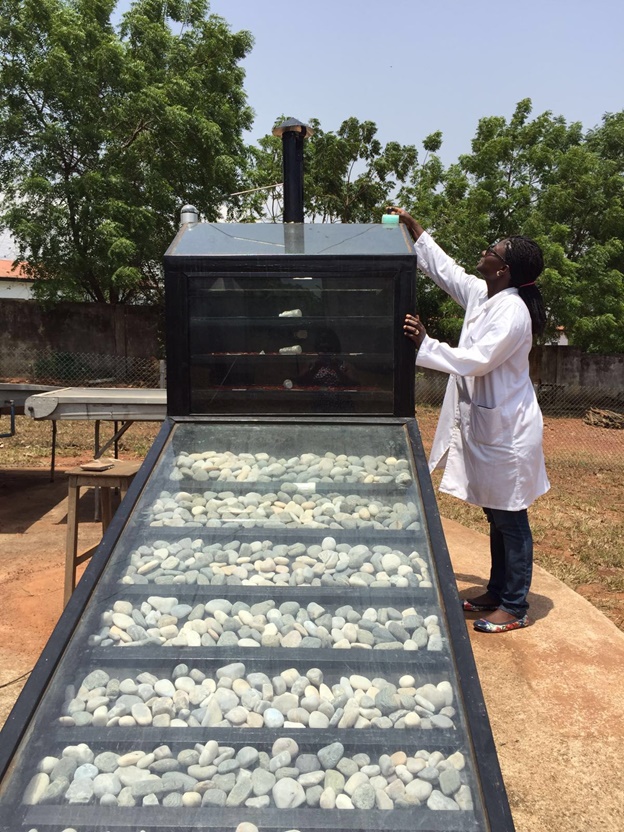
As a consumer, I’m happy to have access to the imported paste if our local farmers are incapable of making them locally for me. But does this expenditure on a produce we are capable of making locally have any impact on our agricultural sector?
Yes, while consumers are enjoying their imported pastes, our local tomato farmers struggle to make a living.
And it gets worse, our dependence on imported paste plays a role in rendering our farmers unemployed.
As tomato imports continue to rise in volumes, about 1,250 Ghanaian tomato farmers stand the risk of being pushed out of employment.
According to The Peasant Farmers Association of Ghana (PFAG), over 700 tomato farmers have already been rendered unemployed as a result of the imports.
So we have $25 million dollars that we spend importing tomato paste, meanwhile, our local tomato farmers are losing their jobs and we are not able to create more value-added job opportunities within the tomato paste production supply chain. How do we solve this problem?
To cut down on the importation, we need to invest in processing facilities.
Alternative, inexpensive but efficient small-scale tomato processing methods are needed: 1) to absorb excess supply and enhance the value chain; 2) Reduce the country’s dependence on imported tomato paste and provide employment opportunities.
Ghana’s religious adherence to the rules of the International Monetary Fund (IMF), the World Bank and the World Trade Organization (WTO) will not allow her to make the investments in the form of subsidy to guarantee market or export subsidies to her farmers.
More so, she cannot protect Ghanaian farmers from the onslaught of cheap imports by way of tariffs and quotas imposition. So the best way to support these farmers is promoting local domestic processing.
Wow, looks like we are left with very limited options but how do we begin to promote domestic processing and how do we ensure it is sustainable?
My research focuses on finding a simple and convenient solution to the processing problems by leveraging technology to reduce post-harvest losses of tomato.
I am working on providing low-cost processing technologies for farmers to better manage their harvests and improve their livelihood.
Through my research, I developed a solar dryer using available materials to process fresh tomato to high-quality tomato powder.
The tomato powder can be reconstituted to tomato paste and used in the formulation of food.
Local processing of tomato paste from solar-dried tomato powder has the potential to cut down on the huge tomato paste import.
This dryer can be set up right at the farm gate, household level or within the community to process tomato powder.
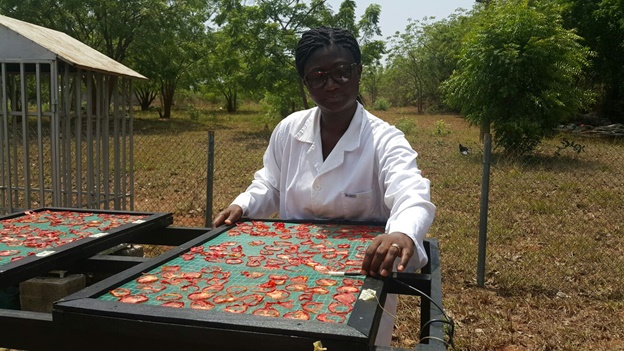
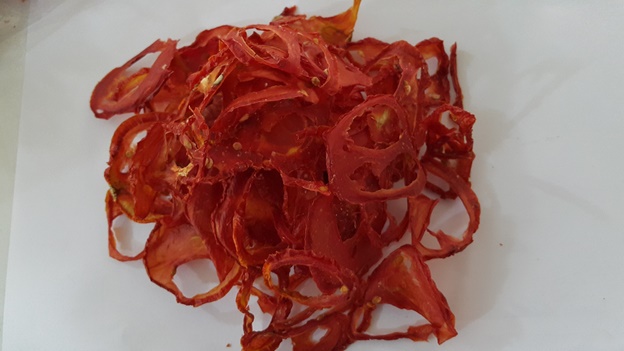
Have you tested this solution out practically or it is mainly theoretical for now?
The dryer is real and it works. I am currently working with a mission-based group in Chuchuliga in the Upper East region to set up a solar drying facility for processing dried tomato.
The success of this project will enhance the tomato value chain and create employment opportunities particularly within this community where livelihoods are lost due to the severe post-harvest losses within the tomato value chain.
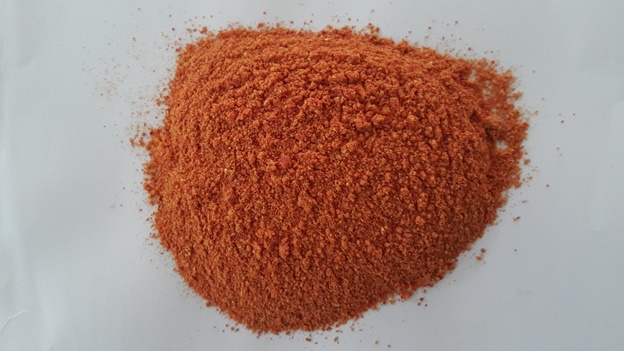
Why are you so passionate about tomatoes? Most of us are aware of our trade deficit and failure to industrialize our agricultural sector, what drove you to actually work on a solution?
In 2010, I read an article on how a number of small scale tomato farmers committed suicide in 2007 as a result of their inability to pay off loans, according to a study conducted to assess the implications of current trade reform programmes on small scale producers, particularly women.
The deceased persons could not deal with the shame of harassment which creditors (mainly individuals) subjected them to.
Most of these farmers had taken loans to produce tomatoes in huge quantities to supply the Pwalugu tomato factory, but when the factory collapsed, they couldn’t sell off their harvests. Some even left the tomatoes on the farms to rot.
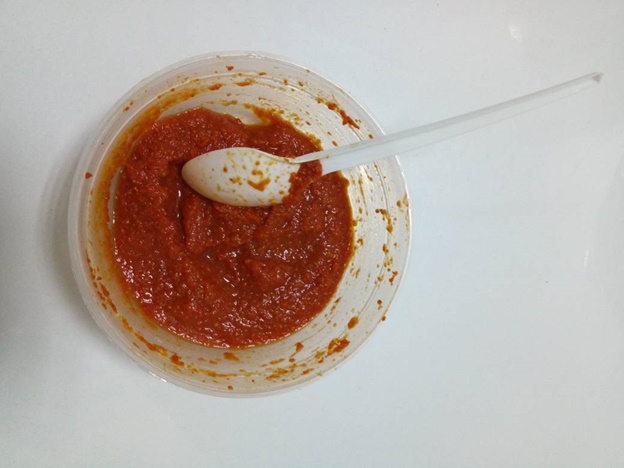
That’s a very terrible thing to experience. But how exactly were you, a scientist, going to solve a financial problem that had driven farmers to kill themselves?
I had a hard time coming to terms with this and so I decided to tailor my research to find a solution to help curb the high losses and to provide an alternative processing method to canning.
This is what propelled me to focus on looking for a solution which was simple enough for easy adoption.
In 2012, I had the opportunity as a research fellow, to explore different technologies for tomato processing at the Louisiana State University and when I got back to Ghana, I settled on solar drying technology because it was a very promising and inexpensive technology for these farmers to explore.
Farmers can even process dried tomatoes on their farms and will not have to leave tomatoes to rot when they cannot secure ready markets for their produce.
This fuelled the idea of developing a dryer suitable for processing tomato into dried products.
How do we support the work you are doing to gradually make the processing of tomatoes a goal that is achievable?
Currently, I am using the $50,000 awarded me to set up a solar drying hub and refurbish my laboratory.
I am upscaling the dryer so it can process higher quantities of dried tomato at a time. I want to use my laboratory and the solar drying hub to train food processors and farmers who want to adopt this technology, but most importantly,
I will love to see this dryer set up in tomato growing areas where processing facilities are lacking. May I say that this award money is not enough to fully support what I am currently doing and I need further funding to acquire more laboratory equipment to support this research project.
I would love to see the solar drying hub concept adopted for the one district, one factory (1D1F) initiative for communities in Northern Ghana, where there is a dire need for it.
As part of my research, consumer studies and sensory tests have been conducted and consumers are willing to adopt and patronise locally processed tomato paste made from tomato powder.



